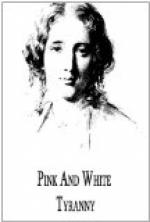If ever our readers have observed two chess-players, both ardent, skilful, determined, who have been carrying on noiselessly the moves of a game, they will understand the full significance of this decisive term.
Up to this point, there is hope, there is energy, there is enthusiasm; the pieces are marshalled and managed with good courage. At last, perhaps in an unexpected moment, one, two, three adverse moves follow each other, and the decisive words, check-mate, are uttered.
This is a symbol of what often goes on in the game of life.
Here is a man going on, indefinitely, conscious in his own heart that he is not happy in his domestic relations. There is a want of union between him and his wife. She is not the woman that meets his wants or his desires; and in the intercourse of life they constantly cross and annoy each other. But still he does not allow himself to look the matter fully in the face. He goes on and on, hoping that to-morrow will bring something better than to-day,—hoping that this thing or that thing or the other thing will bring a change, and that in some indefinite future all will round and fashion itself to his desires. It is very slowly that a man awakens from the illusions of his first love. It is very unwillingly that he ever comes to the final conclusion that he has made there the mistake of a whole lifetime, and that the woman to whom he gave his whole heart not only is not the woman that he supposed her to be, but never in any future time, nor by any change of circumstances, will become that woman; for then the difficulty seems radical and final and hopeless.
In “The Pilgrim’s Progress,” we read that the poor man, Christian, tried to persuade his wife to go with him on the pilgrimage to the celestial city; but that finally he had to make up his mind to go alone without her. Such is the lot of the man who is brought to the conclusion, positively and definitely, that his wife is always to be a hinderance, and never a help to him, in any upward aspiration; that whatever he does that is needful and right and true must be done, not by her influence, but in spite of it; that, if he has to swim against the hard, upward current of the river of life, he must do so with her hanging on his arm, and holding him back, and that he cannot influence and cannot control her.
Such hours of disclosure to a man are among the terrible hidden tragedies of life,—tragedies such as are never acted on the stage. Such a time of disclosure came to John the year after Grace’s marriage; and it came in this way:—
The Spindlewood property had long been critically situated. Sundry financial changes which were going, on in the country had depreciated its profits, and affected it unfavorably. All now depended upon the permanency of one commercial house. John had been passing through an interval of great anxiety. He could not tell Lillie his trouble. He had been for months past nervously watching all




